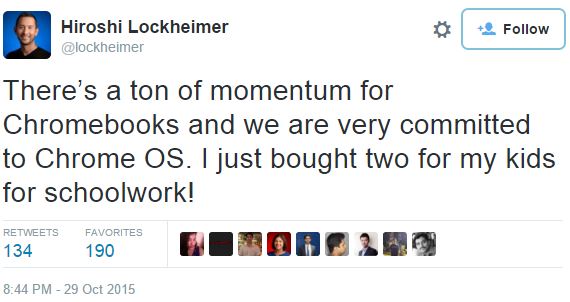New Android Chief Promises Chromebook, Chrome OS Commitment
Right after the Wall Street Journal published a report that Chrome OS will be folded into Android, the new Android chief, Hiroshi Lockheimer, tweeted that Google is still very committed to Chromebooks and Chrome OS.
This shows that Google wasn't expecting the Chrome OS and Android merger plans to come out this year. The WSJ report said that the final new OS isn't expected to come out until 2017 (Android "O?"), but that Google should preview it next year (probably at Google I/O, the company's developer-focused conference).
With such a long time before even a first preview, it's understandable why Google wouldn't want the news to come out just yet. Merging the two operating systems could make Chromebook users think that their OS may not be supported anymore. Google has promised four years of support for all Chromebooks, so it's unlikely that promise will be broken.
Worse case scenario, Chromebook users who still need a couple more years of Chrome OS updates after Chrome OS is deprecated will still receive this new version of Android that will work on notebooks as well, as some kind of "upgrade."
Those who may have the biggest worries about this report would be institutions and businesses that may have been thinking of buying Chromebooks soon, but now they may want to wait to see what happens in 2017. What if they don't like how Android turns out on the desktop? Should they still commit to Chrome OS today?
Perhaps the even more important question is whether the new OS will even receive updates for at least as long as Chrome OS did. Right now, even the longest Android update cycles are half the update cycle of Chrome OS, which is four years. Plus, for many consumers and businesses, even four years may seem too low.
Microsoft promised 10 years of updates for its Windows 10 operating system. If Google wants Android-based notebooks to be taken seriously, at the very least in enterprise, it needs to offer at least 6-8 years of updates.
Get Tom's Hardware's best news and in-depth reviews, straight to your inbox.
Although it's Chrome OS that's getting folded into Android, chances are that this new OS will be fully controlled by Google, just like Chrome OS was. This means Google itself will provide those updates, making it more likely to succeed in delivering updates for much longer than what we typically see in the Android ecosystem.
______________________________________________________________________
Lucian Armasu joined Tom’s Hardware in early 2014. He writes news stories on mobile, chipsets, security, privacy, and anything else that might be of interest to him from the technology world. Outside of Tom’s Hardware, he dreams of becoming an entrepreneur.
You can follow him at @lucian_armasu. Follow us on Facebook, Google+, RSS, Twitter and YouTube.
Lucian Armasu is a Contributing Writer for Tom's Hardware US. He covers software news and the issues surrounding privacy and security.
-
schultzter At their core both Android and Chrome OS are Linux-based. It's not too hard to imagine Chrome OS running on-top of a Linux layer that owes more to Android than any flavour of Linux, so it has the necessary libraries to allow Android apps to run along-side Chrome apps. And the potential for Chrome OS API's to implemented in the Chrome Browser - allowing apps to seamlessly cross from one platform to another.Reply
Whether they call it Android or Chrome OS I guess is a decision for the marketing department. -
Thomasis75 Was going to buy a Chromebox running Chrome OS as my home computer but won't now. Will be sticking with Windows 10 since it will be good to go for at least another 7-10 years. And this NEW Windows 10 software is currently running just fine on my 7 year old AMD motherboard. That means that by the time Windows 10 finally bites the dust my computer hardware will most likely be about 14 years old. Now that is what I call a significant REDUCTION in our electronic waste stream.Reply
It is really sad that Google has decided to take this approach since I really enjoy the simplicity of Chrome on my desktop. Mucking up Chrome with a bunch of Android apps seems just so wrong. It will probably be just another product you throw away like your phone every 2 or 3 years. Someone at Google needs to understand the difference between the stability of the desktop environment instead of the throw away mentality of the phone market. -
tiddlypip It seems to me that Google are looking at enabling chrome os on smartphones when docked rather than android on chrome.Reply -
ZolaIII They need to go much closers to the mainline Linux or better yet to level it up & become one (new Linux distro). Currently Tizen is much closers to mainline. Their is much on going work on enabling QT & KDE environment including app ecosystem & this must be a first priority so that Android can be useful in usual productivity tasks tied for desktop computers. If we are lucky enough QT will become leading app framework truth time & known Java based apps will become legacy. If Google have any brains it won't insist on closed management of this future Android OS. Even now I see AOSP as a real leader concerning community work along with long stand suport. There are 4+ years old Sony phones with still active AOSP official suport. I don't see Chrome OS as something even remotely useful or good, it whose mistake from the beginning (too closed look of its makers that it could grow & evolve) all do I do appreciate help work on core boot from guys behind Chrome OS (for my pure non Chrome Linux experience).Reply

